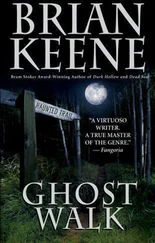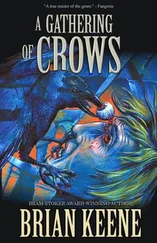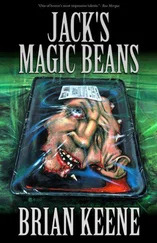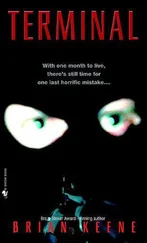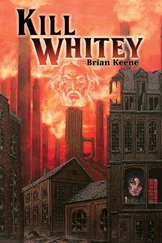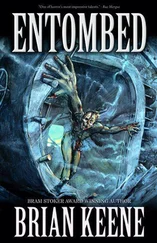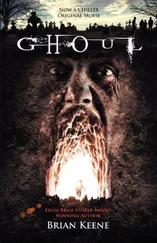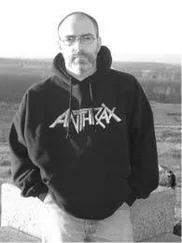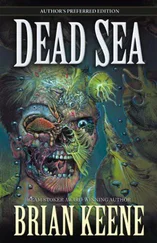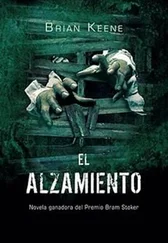I’m losing it. The darkness isn’t a living thing. Keep moving, Heather. You owe it to Javier and the others. Go, damn it. Just go!
She shuffled forward, her body aching with every hesitant step. Her feet came down on something soft. Frowning, Heather knelt on the cavern floor and reached out experimentally. The material felt like a mix of newspaper strips, scraps of cloth, and fiberglass insulation. When Heather had been younger, she’d owned two hamsters named Tweedle-Dee and Totally-Dumb. The bedding in the bottom of their cage had consisted of newspaper scraps and pine shavings. This reminded her of that.
The stench was at its strongest here, but so was the breeze. Both washed over her, seeming to cling to her body. Heather coughed, unable to control the urge any longer. She froze, listening for any sign that she’d given her position away, but the tunnel remained silent behind her. Heather started to wonder if maybe she was wrong. Maybe Scug and the others had given up. Or maybe they were waiting. Maybe this was a dead end and they knew she’d have to come back.
She coughed again, gagging. It occurred to her that if she dropped lower, perhaps the nauseating odor wouldn’t be as bad. After all, wasn’t that what firemen said to do during a fire? If you dropped to the ground, the smoke couldn’t reach you, because it climbed higher. Maybe the same thing would work in this situation. Anything was better than kneeling here and breathing it in. She could taste the reek in the back of her throat—oily and sour.
She hunkered down on her hands and knees and crawled forward. The material on the floor rustled beneath her, but Heather pressed onward, deciding that it was too late to change course. Her eyes still watered and stung, and her throat still felt coated, but the stench seemed more tolerable at ground level. Heather didn’t know if it was her imagination or not. Then her hand came down on something hard and cylindrical. Cold metal. A flashlight!
Oh please let there be batteries in it. Oh please oh please oh please . . .
She debated whether to try it. If her pursuers were still there, the flashlight would undoubtedly lead them right to her. On the other hand, if they weren’t, having some visibility would help her escape that much quicker.
If it even works. Don’t know until I try it.
Holding her breath, Heather found the button on the side of the flashlight and pressed it. She almost passed out when the light came on. It was weak, but compared to the utter blackness she’d found herself in a moment before, the beam flooded the space with dazzling brilliance. Spots floated in front of Heather’s eyes. She closed them for a moment and then opened them again, squinting and letting them adjust. When she could see again, she looked around.
She was in a large, round chamber, with tunnel openings on each end. The floor was indeed piled high with bedding—shredded newspapers and magazines, strips of old blankets, sheets and clothing, rolls of fiberglass insulation, and other soft material. Heather felt a bizarre surge of pride that she’d been able to identify the assortment just by touch. Scattered among the litter were old, broken toys—a dump truck missing a wheel, a doll with stuffing leaking from its seams, wooden blocks covered with mold.
With dawning horror, Heather realized that she was standing in some obscene nursery.
She climbed to her feet and hurried onward, stumbling for the exit. The smell was like a wall, but she no longer cared. She put her head down, breathed through her mouth, and forced herself to keep going.
She left the nursery and continued on. The passageway was short—more of an alcove than an actual tunnel. It opened into an even larger chamber. She stopped and shined the flashlight around. The landscape became clearer, but no less unsettling. There were heaps of refuse in front of her, islands of filth and ruined furniture, as well as broken, waterlogged lumber, rusted tin cans, glass bottles, scraps of cloth, and what looked like leather. None of it was new. Most of the debris was decrepit with age and rotten to the point of being almost unrecognizable. All of it stood in water deep enough to hide the floor below. Heather fanned her nose. The water was the worst—more sludge than liquid. She shined the flashlight across it and saw faint discolored rainbows of stagnated pollution and lumps of feces. Then she noticed something else.
Bones.
The water was full of human remains—all of them skeletal and picked clean, none of them complete. A shattered femur here. A broken rib cage there. A splintered half-skull grinning at her from the muck.
Heather stifled a scream and trained the beam of light on the reeking mounds of garbage. To her surprise, the piles were honeycombed with holes—manufactured caves. They were igloo-like structures made of refuse and filth, lined with old newspapers and scraps of other debris. Deep within those black hidey-holes, shapes began to stir, clearly disturbed by her sudden intrusion.
At one time in her life, Heather had planned on becoming a veterinarian. That dream had faded in quick succession when she decided to become a nurse, a hairdresser, and then a lawyer, before ultimately admitting that she had no clue what she wanted to be when she graduated—not that the admission had stopped her parents and the school guidance counselor. But during the brief time that she’d considered a career in veterinary services, Heather had watched every nature show she could find on television and absorbed every detail. There had been certain rules among the animals, and thinking of those rules while looking into the vile warren in front of her, she understood that the rules of nature had not merely been broken, but discarded completely.
Nature took care of certain things. In the wild, if a malformed cub was born to wolves or bears, it was most likely immediately put to death as a mercy, because life was not kind and certainly did not favor the weak. As the creatures emerged from their dens, Heather understood at last what she’d walked into. The things she had seen before, the ones that had killed her friends and chased them through the house and the caverns, and even the mutated infants from the previous tunnel—all of those had been healthy. Deformed, obviously, but healthy. The creatures that lived here in this festering pit were the things that nature would have killed in the wild. These were the children that could not fend for themselves, the rejects and the weaklings. The mutant mutants. But for whatever reason, they had not been killed.
Heather looked at the squalor around her, caught the scent of rotting filth and decay, glanced down at the bones, and felt a chill work through her whole body.
Not killed. They had been thrown away instead.
Discarded like trash, rather than living beings.
Left to their own devices. Maybe occasionally thrown some scraps of food—or maybe the skeletons just belonged to someone like herself, unlucky enough to escape the house and the caverns unscathed, but then stumble into this part.
The chamber before this one had been a nursery. This place was an orphanage—or a garbage dump. Or both.
Somewhere to her right, one of the castoffs mewled and dropped into the water with a loud splash. She missed its dive but spotted the ripples that radiated from the point of impact.
“You better stay the hell over there if you don’t want to get the crap beat out of you.”
Her shaky voice echoed around the chamber. The things living in the heaps and slithering through the sludge made reciprocal noises. She let her eyes roam around the pit, searching the garbage for anything useful, but saw nothing that she could use. There were ripples spreading out from several places in the water now, and tiny, shadowy forms moved beneath the surface. Her feet were at the very edge of the foul muck, and Heather stepped back, unsettled.
Читать дальше

